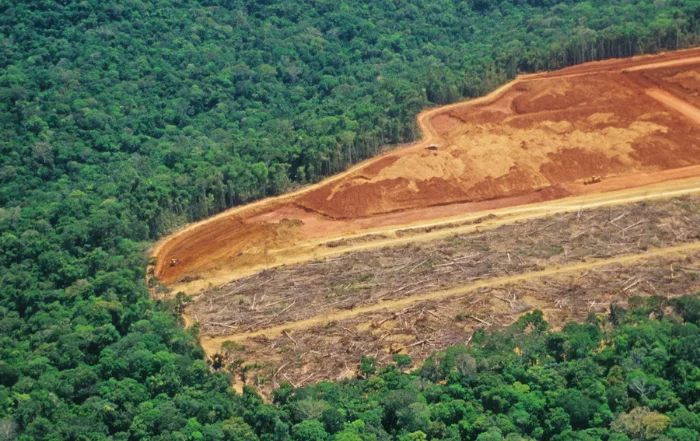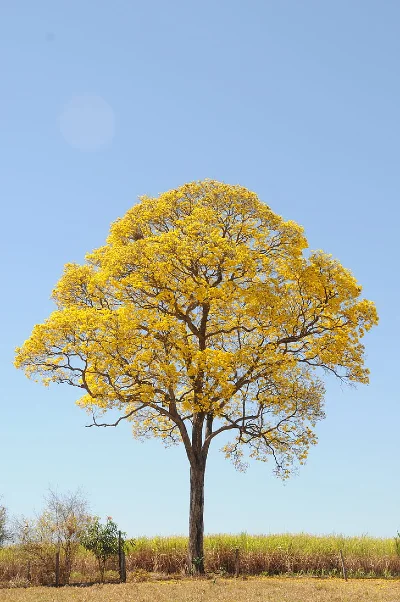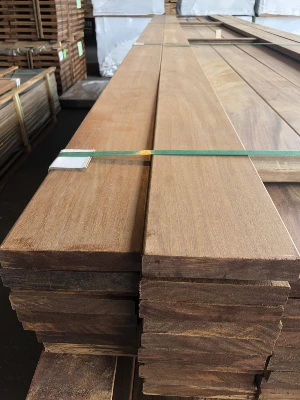Ipê, a luxurious tropical hardwood that’s also known as Brazilian Walnut, has become a preferred choice for constructing high-end wooden decks, capturing the attention of markets across North America and Europe. Its surging demand, however, has given rise to alarming levels of illegal harvesting, particularly in Brazil, its primary country of origin.
Ipê’s Soaring Popularity and the Ensuing Crisis
Recent research conducted by Sweden’s esteemed Chalmers University of Technology brings to light the staggering reality that an estimated 75% of all Ipê wood sourced from Brazil’s leading production regions may have been acquired through illicit means. “Through this study, we’ve been able to pinpoint the most vulnerable links in the supply chain, providing a vital resource in the battle against illegal logging,” shares Caroline S.S. Franca, a Ph.D. candidate at Chalmers, emphasizing the study’s potential impact.
The Unique Qualities of Ipê and Market Trends
Ipê stands out as one of the most resilient hardwoods worldwide, making it an ideal material for constructing balconies, sunrooms, staircases, and docks. Its exclusivity and robustness have only fueled its appeal in markets across Europe, America, and Canada. Over the last decade, Brazil, responsible for a staggering 96% of all Ipê available on the global market, has seen a 76% surge in export volumes.
This trend, however, brings with it a dark underbelly. In November 2022, Ipê found itself on the Cites list of species under threat, a direct consequence of its soaring popularity and the relentless international trade.
The Slow Growth of Ipê and Implications for Conservation
Caroline S.S. Franca, deeply involved in the study, highlights a critical concern, “Certain rainforest products carry a higher value, rendering them more susceptible to illegal logging practices. Ipê tops this list. Additionally, given its slow growth rate, the regeneration of Ipê forests is a lengthy process. We are looking at a tangible risk of extinction, with current data on the remaining tree population and the extent of damage to existing stands being worryingly unreliable.”
Tracing the Roots of Illegal Logging in Brazil
Caroline S.S. Franca stands at the forefront of a pivotal research project aiming to unravel the intricate web of illegal Ipê logging in Brazil. The study, entitled “Quantifying timber illegality risk in the Brazilian forest frontier,” was recently featured in the acclaimed journal Nature Sustainability. In it, the team meticulously sifted through extensive datasets to pinpoint the segments of the supply chain that are most susceptible to illicit activities.
The unsettling findings suggest that a staggering 75% of all Ipê wood originating from Pará, Brazil’s premier Ipê producing state and a significant contributor to global exports, may have been illegally harvested between 2009 and 2019.
“We’ve unearthed concerning trends, such as the alarming fact that 16% of Ipê entering the market has been acquired without the necessary permits. Furthermore, there are inconsistencies with landowners’ claims, as they report harvesting volumes of Ipê that seemingly surpass the plausible existence on their properties. Additionally, the market seems to be flooded with more wood than official production statistics account for,” Caroline S.S. Franca elaborates on the findings.

Cracking Down on Illegal Timber: How Data Can Save the Amazon’s Precious Ipê Trees
Illegal logging is a notorious catalyst for forest degradation, and its association with organized crime, community disruption, and ecological devastation is well-established. “The Amazon’s degradation extends beyond local implications, impacting the forest’s rich biodiversity and contributing significantly to climate change, on par with the effects of deforestation,” Caroline S.S. Franca emphasizes the far-reaching impacts of the issue.
She envisions the study’s outcomes as a powerful tool to enhance awareness of illegal logging’s prevalence among policymakers, supply chain stakeholders, and consumers alike.
Caroline S.S. Franca’s co-author, Marco Lentini, brings a wealth of expertise in sustainable forest management in the Brazilian Amazon to the research. He highlights the study’s innovative approach, “We’ve developed new methodologies, analyzing existing transaction patterns and approvals for Ipê exploration. These innovations hold immense promise for enhancing Brazil’s forest control systems and aiding actors along the supply chain in their quest for responsible and sustainable timber sourcing.”
The duo’s work marks a significant stride toward dismantling illegal logging networks and fostering a culture of accountability and sustainability in the Ipê wood trade, ensuring the protection of one of the world’s most cherished hardwoods and the preservation of the Amazon’s irreplaceable ecosystem.
Harnessing Political Momentum and Consumer Power to Combat Illegal Ipê Harvesting
Recent statistics from Brazil’s forest monitoring system illuminate a glimmer of hope in the battle against deforestation, showcasing a significant 50% reduction in Amazon deforestation rates in 2023 as compared to the previous year. Brazilian President Luiz Inácio Lula da Silva has played a pivotal role in this progress, catalyzing the Belém Declaration, a monumental alliance among eight South American nations, dedicated to eradicating Amazon deforestation. Officially adopted on August 8, 2023, this declaration marks a critical step towards collective action.
Martin Persson, an experienced Amazon researcher and co-author of the Ipê study from Chalmers University of Technology, applauds this initiative. “The Belém Declaration is a strong signal of the renewed political determination to curtail deforestation. However, it’s crucial to acknowledge that the declaration alone is not a silver bullet. The journey towards halting deforestation and forest degradation demands the implementation of robust policy measures,” he asserts.
Persson further highlights that the key to effective action lies in utilizing the wealth of existing data and information, empowering authorities to track down and hold accountable those involved in illegal logging activities.
The Critical Role of Informed Consumer Choices
The FSC (Forest Stewardship Council) certification stands as a beacon for consumers aiming to make responsible wood purchases, distinguishing sustainably sourced wood from its counterparts. Caroline S.S. Franca, however, stresses that due diligence shouldn’t end with spotting an FSC label.
“Consumers play a vital role in this equation. It’s essential to probe deeper, asking questions like ‘What is the exact origin of this wood? Can you provide documentation tracing its journey through the production chain?’ By demanding transparency, consumers enhance their capacity to make conscientious decisions, directly influencing market dynamics,” she elaborates.
Insights into the Ipê Market


Country of Origin
Brazil stands as the predominant source of Ipê, accounting for 96% of the global market supply.
Surging Demand
Between 2010 and 2021, Brazil witnessed a staggering 76% increase in Ipê export volumes.
Major Consumer Markets
North America, Europe, and Canada collectively make up 85% of the global Ipê demand, with Europe alone absorbing 45% of the exports.
Exports by Volume
From 2017 to 2021, an estimated 525,000 metric tons (equivalent to 470,000 cubic meters) of Ipê were exported from Brazil, Bolivia, Paraguay, and Peru.
Conservation Status
Over two-thirds of the species categorized as Ipê and exported from the Amazon region between 2017 and 2021 are listed on the IUCN Red List of Threatened Species. Additionally, Ipê itself is recognized as a species threatened by overexploitation, particularly due to its popularity in international trade.
FSC’s Role
The Forest Stewardship Council (FSC) operates with a mission to promote sustainable forest management worldwide. Products bearing the FSC certification signify reduced risk of originating from controversial sources, such as illegally harvested wood or wood sourced from forests with endangered conservation values.
As the allure of Ipê continues to grow across continents, the imperative to address and curtail illegal logging practices becomes paramount.
Through rigorous studies and heightened awareness, there’s a glimmer of hope in preserving this invaluable resource, ensuring its sustainability for future generations.
More To Discover
- Carnegie Mellon Study Proves Grocery Delivery Is Less Sustainable than In-Store Shopping
- Lab-Grown Oil: The Next Frontier in Sustainable Food Production?
- Regional Differences Drive Distinct Motivations for Energy-Efficient Home Upgrades Across the U.S.
- The Required Innovations in Food and Agriculture for Climate Resilience and To Feed The Future of The World
The Chalmers University of Technology’s research not only sheds light on the issue but also provides tangible solutions to mitigate the risks, laying down a path toward responsible consumption and conservation.
Source: Nature Sustainability



















